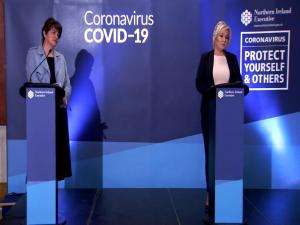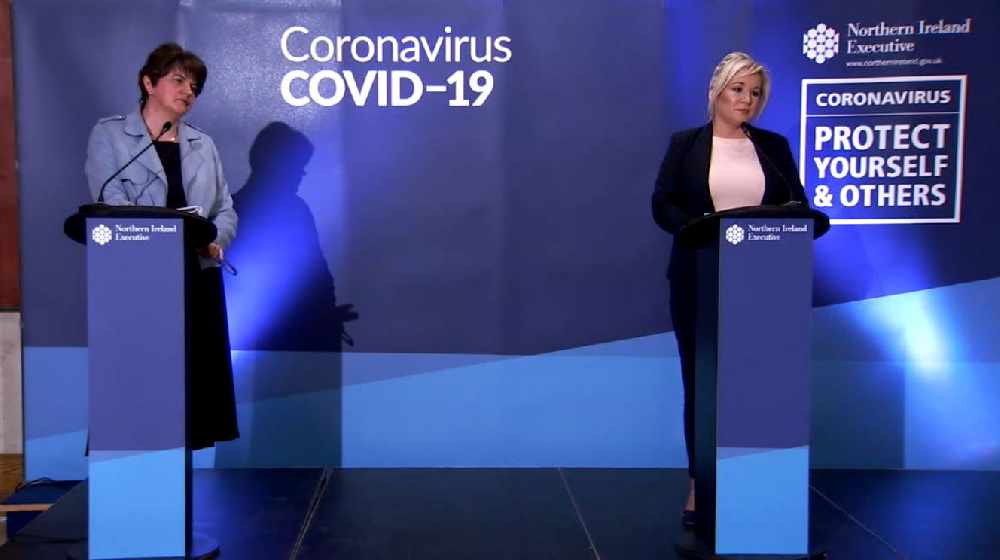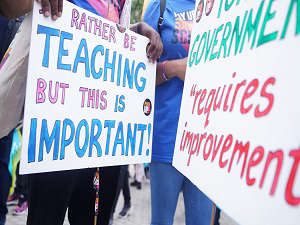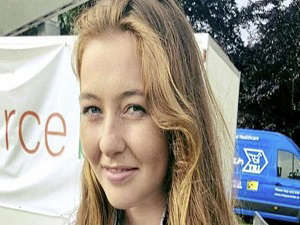
By Michelle Devane and Cate McCurry, PA
People have been urged to avoid all unnecessary travel across the border between Ireland and Northern Ireland in an effort to curb the spread of Covid-19.
Ireland’s acting chief medical officer Dr Ronan Glynn and his Northern Ireland counterpart, Dr Michael McBride, have also made a specific appeal to teenagers and people in their 20s and 30s in Donegal and Londonderry to reduce their social contacts.
The two medical officers met on Friday as part of an effort to reduce travel between border counties.
It comes after the Irish Government announced that it is tightening its coronavirus restrictions in Co Donegal and as case numbers continued to increase across the island.
In the Republic, 326 additional cases of Covid-19 were confirmed on Friday, while in Northern Ireland 273 new cases were recorded.
No new deaths due to the virus in either jurisdiction were reported.
Today there has been 273 COVID cases in the North
— Michelle O’Neill (@moneillsf) September 25, 2020
This is the highest number of daily cases since March
We are at a dangerous junction, but we can still turn this around
There is hope, though we all must play our part
Follow health guidelines & play YOUR part in saving lives
In a joint statement, Dr Glynn and Dr McBride said: “Given the current number of new cases in Donegal and neighbouring areas of NI in Derry, Strabane and Fermanagh we would appeal to everyone to avoid all but necessary travel across the border.
“It is also recommended that employers on both sides of the border make every effort to facilitate employees to work from home in so far as is possible.
“We realise that for those living in border areas this will not be welcome news but we must prevent further spread of this virus and we can only do so by working together to protect each other.”
Donegal will move to risk level three of the Government’s plan to deal with Covid-19 following advice from the National Public Health Emergency Team (NPHET) as of midnight on Friday.
The restrictions will last for three weeks.
Dr Ronan Glynn on how each of us can live safely with this virus over the coming months. Do not underestimate the value of your individual actions. Please stick with this and together we will get through #COVID19 #StaySafe [for subtitles/closed captions, select "cc"]. pic.twitter.com/HdO92ycHBa
— Department of Health (@roinnslainte) September 25, 2020
The chief medical officers said they were concerned about the significant proportion of cases in young people in Donegal and Derry, and asked teenagers and those in their 20s and 30s in particular to reduce their social contacts.
They also jointly called for everyone across the island to continue to follow public health advice to keep themselves and others safe.
They said close collaboration between the relevant authorities in Northern Ireland and Ireland would “continue and be strengthened” in the coming days to address the concerning trend in case numbers on both sides of the border, not only in Donegal and Derry, but also in other areas along the border where the profile of the disease continues to evolve.
Following the release of the latest figures Dr Glynn said he was asking people everywhere, but in particular in Donegal and Dublin, to pay special attention to the public health advice “because while there is every chance that other areas will have to move to level 3, there is nothing inevitable about it”.
Donegal’s 14-day incidence rate is now higher than Dublin’s, with 148.2 positive cases per 100,000 population, and Dublin recording 144.5 positive cases per 100,000.
In neighbouring Derry and Strabane council area, the rate in the last seven days is 141.4 positive cases per 100,000 population – the highest in Northern Ireland.
Their statement comes as Taoiseach Micheal Martin urged Northern Ireland leaders to harmonise public health measures as the number of Covid-19 cases grows rapidly on both sides of the border.
The Fianna Fail leader spoke to First Minister Arlene Foster and Deputy First Minister Michelle O’Neill after the Irish Government’s announcement that Donegal would face stricter Covid-19 restrictions.
Mr Martin said on Friday that he did indicate to them that “on a practical level, it would make sense if we could harmonise as closely as possible respective public health measures”.
“The numbers on the other side of the border are high and worrying for authorities there.”
Mr Martin said the respective medical officers were working to different systems so it “makes sense that there would be co-ordination, particularly in messaging and communications, and also in terms of testing and contact tracing”.
“That would be enhanced in terms of the interaction between GPs on both sides of the border.”
He said he is appealing to people’s “good sense and common will” to adhere to the updated public health measures in Co Donegal.

Mrs Foster said she discussed with the Taoiseach the need for “practical co-operation” .
She cautioned anyone considering a cross-border leisure trip at the weekend to stay at home.
“People shouldn’t try to game the regulations, people should use their common sense,” she said.
“What we’re trying to do at the moment is to break the transmission of the virus and the way to do that is to follow the regulations and to follow the advice and I think people should listen very carefully to the advice that’s been given to citizens in Donegal but also to what we’re saying here in Northern Ireland.”
Ms O’Neill said the authorities north and south needed to work in lockstep.
“I think that the fact that we live on an island is an advantage to us and we need to work very hard to make sure that we are moving in tandem in fighting back against Covid-19,” she said.
Mr Martin also warned that the NPHET could advise the Government to enforce local restrictions in cities including Cork, Limerick, Galway and Waterford.
The number of cases is continuing to rise in these areas, sparking concern among public health experts.
He made the comments as he visited Workvivo headquarters in Douglas, Cork, where 100 jobs are to be created over the next three years.


 Teacher unions to ballot members for industrial action over pay
Teacher unions to ballot members for industrial action over pay
 Police apologise as watchdog finds Katie Simpson’s family ‘failed’ by probe
Police apologise as watchdog finds Katie Simpson’s family ‘failed’ by probe
 O’Neill lays wreath at Cenotaph in Belfast on Remembrance Sunday
O’Neill lays wreath at Cenotaph in Belfast on Remembrance Sunday
 Former Sinn Fein press officer jailed for child sex offences
Former Sinn Fein press officer jailed for child sex offences
 Mixed reaction from Northern Ireland’s political leaders to Trump presidency
Mixed reaction from Northern Ireland’s political leaders to Trump presidency